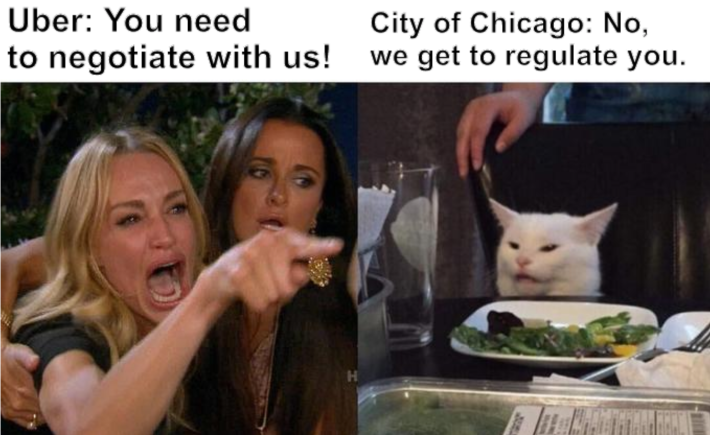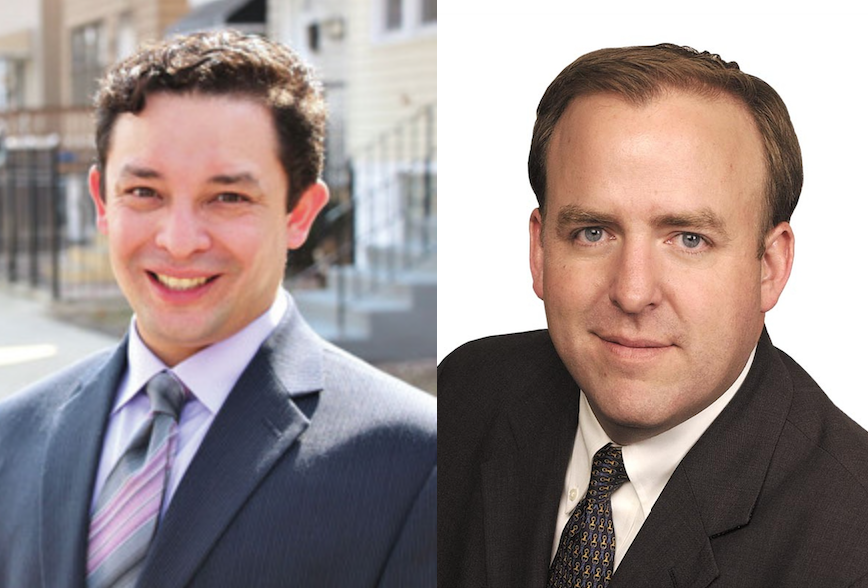With the final vote on Mayor Lori Lightfoot's fair ride-hail tax proposal coming up next Tuesday, November 26, the debate over the initiative is moving quickly. Uber is desperate to maximize its trips in Chicago, especially lucrative, traffic-clogging solo, downtown, peak-hour rides, which would see a $2.28 increase under Lightfoot's plan. The company also urgently wants to prevent our city from setting a precedent that will lead to higher fees in other U.S. cities.
As such, Uber's PR flacks have been throwing everything they have at the wall in hopes that something will stick, including so many vaporware counterproposals that it's difficult to keep track of them all. What all of these alternative schemes have in common are much lower taxes on most rides, which would result in little impact on reducing traffic congestion or stopping CTA ridership bleeding, plus attractive numbers for all the additional revenue that would be generated, seemingly plucked from the ether.
Sadly, Chicago's two main dailies papers have taken the bait. Ignoring the fact that Uber has run a cynical misinformation campaign, promoting the easily disproved falsehood that the city's plan would hurt poor and working-class people, the Tribune and Sun-Times have both run "very fine people on both sides" editorials urging Lightfoot to compromise with the unscrupulous company by accepting one of its bogus proposals.
From the Trib piece: "A suggestion to Madame Mayor and Uber leadership: Stop spewing exhaust. Reroute your energy toward securing a plan that alleviates downtown traffic congestion without burdening ride-share passengers on the South and West sides with higher fees they’ll struggle to afford." The editorial writers clearly haven't done much research on the nuts and bolts of the mayor's plan because, with high taxes serving as a deterrent to private rush-hour trips in the CBD, and most South and West side trips costing less, Lightfoot's proposal already achieves those goals. No compromise needed.
The latest Sun-Times editorial, published at 10:47 p.m. Monday night, is even lamer. Uber's latest counterproposal, apparently cooked up roughly 36 hours ago, promises that they'll guarantee the city will make $10 million more than Lightfoot's projected $40 million annually. Never mind that, with much lower fees, especially downtown, Uber's latest pricing scheme is unlikely to do much about congestion, let alone raise more money than the mayor's plan.
"Lightfoot’s office says she’s moving forward with her original proposal," the Sun-Times editorial concludes. "We hope she reconsiders." Funny, a few paragraphs earlier the paper admitted, "Truth be told, we’re not smart enough to know which proposal — Uber’s or the city’s — is ideal." So if they haven't actually done their homework on the numbers, why the heck are they writing editorials telling city officials -- who've done a deep dive into the issue with a detailed report -- what to do?

There was more nonsense about Uber's latest proposal during today's Finance Committee hearing at City Hall, when 15th Ward alderman Raymond Lopez argued that the company's dubious promise of $50 million a year was an offer the city couldn't refuse. He noted that Chicago is struggling to balance its budget. "For this administration to say, 'Well we're worried about whether there's two people in an Uber or one, so we're going to skip out on $10 million dollars'... why would we just shut the door on that?" He asked for another two months two "hammer out" a deal with the ride-hailing companies.
32nd Ward alderman and Finance chair Scott Waguespack countered that Lightfoot's plan is based on the city's detailed analysis of ride-hail data, and her proposal been in the works for several weeks or months. "We're voting on [the mayor's proposal] today because this is something that has been worked on, not something that popped up last night in an editorial."
"This isn't something something new, this isn't something you pull out of thin air," Lopez insisted.
Rosa Escareno, commissioner of the Chicago Department of Business Affairs and Consumer Protection, which oversees ride-hail, responded that Uber has presented four different counterproposals, and this latest one merely consists of four bullet points. She characterized the plan as being more-or-less like Lightfoot's, but with lower fees that would have less impact on congestion, adding that she's puzzled why the company thinks charging less money would result in more $10 million revenue.
Lopez then made a motion to remove the mayor's ride-hail plan from the city's 2020 budget, which was eventually killed in a role call vote, although aldermen Brian Hopkins (2nd), Lesley Hairston (5th), Anthony Beale (9th), and Jason Ervin (28th) sided with Lopez.
Afterwards downtown alderman Brendan Reilly's offered a pithy reality check on Uber's counterproposal.
Everyone's talking about this new revenue proposal that Uber and Lyft magically discovered overnight. I appreciate that... but it's not lost on me that Uber and Lyft weren't lining up two months ago or three months ago to come in here to talk about helping the city to find new revenue. Is that correct -- did they come in many months ago to say, "Please raise fees on us"? No, of course they didn't. They showed up when they got scared. And my experience with the sharing economy, because we've got our friends over at Airbnb... when they say "trust me," think twice.
My experience with the sharing community, looking at other cities, is that they get away with just as much as they can, whenever they can, and if they're up against the wall, suddenly [there's] altruism. "How can we help our partner at the city of Chicago?" Well I disagree with that approach. This was not a good-faith proposal, this was, "Please, get us off the bus. Let's find some way to slow this thing down." I've worked for regulated industries, and that is in the playbook folks. So this is nonsense. I'm glad that we preserved the $40 million in the budget, and if there's room to make improvements, well, gosh, I will roll up my sleeves with any member of this Council to do that.
During the public comment portion, representatives from Chicago's big three sustainable transportation advocacy organizations testified in favor of Lightfoot's ride-hail tax. Metropolitan Planning Council transportation director Audrey Wennink noted that the increase in vehicle miles traveled due to ride-hailing has raised the risk of traffic crashes, saying "We need to invest in transit for all Chicagoans." Active Transportation Alliance spokesperson Kyle Whitehead said it was predictable that Uber and Lyft would misrepresent higher taxes on ride-hailing as being inequitable. And Elizabeth Irvin, transportation director for the Center for Neighborhood Technology, praised the plan to lower taxes on shared rides while increasing them on solo trips, calling the proposal "an important first step" for reducing downtown congestion.
It appears that there's momentum for the ride-hail initiative to pass next Tuesday. But who knows what Uber will pull out of its hat next?





